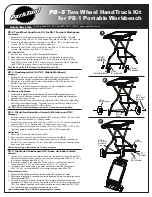
Do not store chemicals in or on the machine (other than automatic
transmission fluid).
Improper use of transmission fluid can cause injury.
Over exposure can have harmful effect on eyes, skin, respiratory system and possible unconsciousness and
asphyxiation.
Improperly blocked vehicles can move.
Set the parking brake and chock the wheels.
Moving vehicles can cause injury.
Moving engine parts.
The engine-cooling fan will cycle on and off depending on the coolant temperature and could operate without the
engine running.
Wear safety goggles.
Always keep objects, clothing, and hands away from the cooling fans and
engine parts.
Moving engine parts can cause injury.
Hot surfaces are present during and after running the engine.
Do not contact hot surfaces such as, manifolds, pipes, mufflers, catalytic converters, or radiators
and hoses.
Hot surfaces can cause injury.
Catalytic converters become extremely hot.
Do not park a converter-equipped vehicle over dry grass, leaves, paper, or any other flammable
material.
Do not touch a catalytic converter until the engine has been off for at least 45 minutes.
Catalytic converters can cause burns.
Cracked fan blade can become airborne.
Examine fan blades for cracks. If found, do not service the vehicle.
Flying objects can cause injury.
Batteries produce explosive gases and can explode, resulting in injury.
Wear safety goggles when working on or near batteries.
Use in a well-ventilated area.
Keep sparks and flames away from the battery and never lay tools, equipment, or other conductive
objects on the battery.
When is connecting to the battery, make sure the unit’s power switch is off. Connect the positive
lead of the unit to the positive lead battery first; connect the negative lead of the unit to a solid
ground point as far from the battery as possible.
Keep battery acid away from skin or eyes. In case of eye contact, flush with clean water for 15
minutes and get medical attention.













































